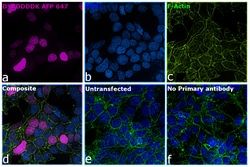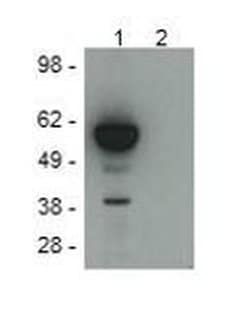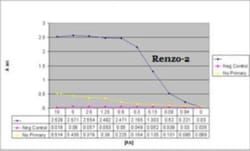200006839
DYKDDDDK Tag Recombinant Rabbit Monoclonal Antibody (8H8L17), Alexa Fluor™ Plus 647, Invitrogen™
Rabbit Recombinant Monoclonal Antibody
Manufacturer: Fischer Scientific
The price for this product is unavailable. Please request a quote
Antigen
DYKDDDDK Tag
Concentration
1.0 mg/mL
Classification
Recombinant Monoclonal
Form
Liquid
Regulatory Status
RUO
Formulation
proprietary buffer with 0.008% Bromonitrodioxane, 0.008% Methylisothiazolone, pH 6.5
Immunogen
Synthetic peptide (DYKDDDDK)
Primary or Secondary
Primary
Content And Storage
4° C, store in dark, DO NOT FREEZE!
Clone
8H8L17
Applications
Flow Cytometry, Immunocytochemistry, Western Blot
Conjugate
Alexa Fluor Plus 647
Host Species
Rabbit
Target Species
Tag
Gene Alias
DDDDK, DDDDK epitope tag, ECS epitope tag, ECS tag, FLAG, FLAG Tag
Isotype
IgG
Purification Method
Protein A
Description
- DYKDDDDK tag, also known as FLAG tag, is a short peptide sequence that is commonly used as a protein tag to facilitate protein purification, detection, and localization
- The tag consists of eight amino acids: Asp-Tyr-Lys-Asp-Asp-Asp-Asp-Lys
- It is often fused to the N- or C-terminus of a protein of interest, allowing for easy identification and isolation of the protein using anti-FLAG antibodies
- The DYKDDDDK tag is widely used in molecular biology and biochemistry research, and has been employed in various applications, such as protein-protein interaction studies, protein expression analysis, and protein localization studies
- The FLAG tag structure has been optimized for compatibility with the proteins it is attached to, in that it is more hydrophilic than other common epitope tags and therefore less likely to denature or inactivate proteins to which it is appended
- FLAG is a registered trademark of Merck KGaA, Darmstadt, Germany.
Compare Similar Items
Show Difference
Antigen: DYKDDDDK Tag
Concentration: 1.0 mg/mL
Classification: Recombinant Monoclonal
Form: Liquid
Regulatory Status: RUO
Formulation: proprietary buffer with 0.008% Bromonitrodioxane, 0.008% Methylisothiazolone, pH 6.5
Immunogen: Synthetic peptide (DYKDDDDK)
Primary or Secondary: Primary
Content And Storage: 4° C, store in dark, DO NOT FREEZE!
Clone: 8H8L17
Applications: Flow Cytometry, Immunocytochemistry, Western Blot
Conjugate: Alexa Fluor Plus 647
Host Species: Rabbit
Target Species: Tag
Gene Alias: DDDDK, DDDDK epitope tag, ECS epitope tag, ECS tag, FLAG, FLAG Tag
Isotype: IgG
Purification Method: Protein A
Antigen:
DYKDDDDK Tag
Concentration:
1.0 mg/mL
Classification:
Recombinant Monoclonal
Form:
Liquid
Regulatory Status:
RUO
Formulation:
proprietary buffer with 0.008% Bromonitrodioxane, 0.008% Methylisothiazolone, pH 6.5
Immunogen:
Synthetic peptide (DYKDDDDK)
Primary or Secondary:
Primary
Content And Storage:
4° C, store in dark, DO NOT FREEZE!
Clone:
8H8L17
Applications:
Flow Cytometry, Immunocytochemistry, Western Blot
Conjugate:
Alexa Fluor Plus 647
Host Species:
Rabbit
Target Species:
Tag
Gene Alias:
DDDDK, DDDDK epitope tag, ECS epitope tag, ECS tag, FLAG, FLAG Tag
Isotype:
IgG
Purification Method:
Protein A
Antigen: TIGIT
Concentration: 1.0 mg/mL
Classification: Recombinant Monoclonal
Form: Liquid
Regulatory Status: RUO
Formulation: proprietary buffer with 0.008% Bromonitrodioxane, 0.008% Methylisothiazolone, pH 6.5
Immunogen: __
Primary or Secondary: Primary
Content And Storage: 4° C, store in dark, DO NOT FREEZE!
Clone: MBSA43
Applications: Flow Cytometry
Conjugate: Alexa Fluor Plus 488
Host Species: Mouse
Target Species: Human
Gene Alias: ENSMUSG00000071552, T cell immunoreceptor with Ig and ITIM domains, T-cell immunoreceptor with Ig and ITIM domains, TIGIT, V-set and immunoglobulin domain containing 9, V-set and immunoglobulin domain-containing protein 9, V-set and transmembrane domain containing 3, V-set and transmembrane domain-containing protein 3, VSIG9, VSTM3, Washington University cell adhesion molecule, WUCAM
Isotype: IgG1 κ
Purification Method: Protein A/G
Antigen:
TIGIT
Concentration:
1.0 mg/mL
Classification:
Recombinant Monoclonal
Form:
Liquid
Regulatory Status:
RUO
Formulation:
proprietary buffer with 0.008% Bromonitrodioxane, 0.008% Methylisothiazolone, pH 6.5
Immunogen:
__
Primary or Secondary:
Primary
Content And Storage:
4° C, store in dark, DO NOT FREEZE!
Clone:
MBSA43
Applications:
Flow Cytometry
Conjugate:
Alexa Fluor Plus 488
Host Species:
Mouse
Target Species:
Human
Gene Alias:
ENSMUSG00000071552, T cell immunoreceptor with Ig and ITIM domains, T-cell immunoreceptor with Ig and ITIM domains, TIGIT, V-set and immunoglobulin domain containing 9, V-set and immunoglobulin domain-containing protein 9, V-set and transmembrane domain containing 3, V-set and transmembrane domain-containing protein 3, VSIG9, VSTM3, Washington University cell adhesion molecule, WUCAM
Isotype:
IgG1 κ
Purification Method:
Protein A/G
Antigen: TIGIT
Concentration: 1.0 mg/mL
Classification: Recombinant Monoclonal
Form: Liquid
Regulatory Status: RUO
Formulation: proprietary buffer with 0.008% Bromonitrodioxane, 0.008% Methylisothiazolone, pH 6.5
Immunogen: __
Primary or Secondary: Primary
Content And Storage: 4° C, store in dark, DO NOT FREEZE!
Clone: MBSA43
Applications: Flow Cytometry
Conjugate: Alexa Fluor Plus 488
Host Species: Mouse
Target Species: Human
Gene Alias: ENSMUSG00000071552, T cell immunoreceptor with Ig and ITIM domains, T-cell immunoreceptor with Ig and ITIM domains, TIGIT, V-set and immunoglobulin domain containing 9, V-set and immunoglobulin domain-containing protein 9, V-set and transmembrane domain containing 3, V-set and transmembrane domain-containing protein 3, VSIG9, VSTM3, Washington University cell adhesion molecule, WUCAM
Isotype: IgG1 κ
Purification Method: Protein A/G
Antigen:
TIGIT
Concentration:
1.0 mg/mL
Classification:
Recombinant Monoclonal
Form:
Liquid
Regulatory Status:
RUO
Formulation:
proprietary buffer with 0.008% Bromonitrodioxane, 0.008% Methylisothiazolone, pH 6.5
Immunogen:
__
Primary or Secondary:
Primary
Content And Storage:
4° C, store in dark, DO NOT FREEZE!
Clone:
MBSA43
Applications:
Flow Cytometry
Conjugate:
Alexa Fluor Plus 488
Host Species:
Mouse
Target Species:
Human
Gene Alias:
ENSMUSG00000071552, T cell immunoreceptor with Ig and ITIM domains, T-cell immunoreceptor with Ig and ITIM domains, TIGIT, V-set and immunoglobulin domain containing 9, V-set and immunoglobulin domain-containing protein 9, V-set and transmembrane domain containing 3, V-set and transmembrane domain-containing protein 3, VSIG9, VSTM3, Washington University cell adhesion molecule, WUCAM
Isotype:
IgG1 κ
Purification Method:
Protein A/G
Antigen: CD45R (B220)
Concentration: 0.2 mg/mL
Classification: Monoclonal
Form: Liquid
Regulatory Status: RUO
Formulation: PBS with BSA and 0.09% sodium azide, pH 7.2
Immunogen: __
Primary or Secondary: Primary
Content And Storage: 4° C, store in dark, DO NOT FREEZE!
Clone: RA3-6B2
Applications: Flow Cytometry
Conjugate: Brilliant Violet 605
Host Species: Rat
Target Species: Human, Mouse
Gene Alias: B220, Cd45, CD45 antigen, CD45R, GP180, Lca, L-CA, leucocyte common antigen, leukocyte common antigen, leukocyte common antigen A, leukocyte common antigen B, loc, LY5, Ly-5, Lymphocyte antigen 5, lymphocyte common antigen, Lyt-4, membrane tyrosine phosphatase, protein tyrosine phosphatase receptor type C, protein tyrosine phosphatase, receptor type C, protein tyrosine phosphatase, receptor type, C, protein tyrosine phosphatase, receptor type, c polypeptide, Protein tyrosine phosphatase, receptor-type, c polypeptide, Ptprc, Receptor-type tyrosine-protein phosphatase C, RT7, T200, T200 glycoprotein, T200 leukocyte common antigen
Isotype: IgG2a κ
Purification Method: Affinity chromatography
Antigen:
CD45R (B220)
Concentration:
0.2 mg/mL
Classification:
Monoclonal
Form:
Liquid
Regulatory Status:
RUO
Formulation:
PBS with BSA and 0.09% sodium azide, pH 7.2
Immunogen:
__
Primary or Secondary:
Primary
Content And Storage:
4° C, store in dark, DO NOT FREEZE!
Clone:
RA3-6B2
Applications:
Flow Cytometry
Conjugate:
Brilliant Violet 605
Host Species:
Rat
Target Species:
Human, Mouse
Gene Alias:
B220, Cd45, CD45 antigen, CD45R, GP180, Lca, L-CA, leucocyte common antigen, leukocyte common antigen, leukocyte common antigen A, leukocyte common antigen B, loc, LY5, Ly-5, Lymphocyte antigen 5, lymphocyte common antigen, Lyt-4, membrane tyrosine phosphatase, protein tyrosine phosphatase receptor type C, protein tyrosine phosphatase, receptor type C, protein tyrosine phosphatase, receptor type, C, protein tyrosine phosphatase, receptor type, c polypeptide, Protein tyrosine phosphatase, receptor-type, c polypeptide, Ptprc, Receptor-type tyrosine-protein phosphatase C, RT7, T200, T200 glycoprotein, T200 leukocyte common antigen
Isotype:
IgG2a κ
Purification Method:
Affinity chromatography






